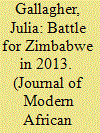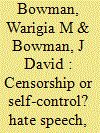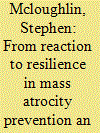| Srl | Item |
| 1 |
ID:
146111


|
|
|
|
|
| Summary/Abstract |
On the face of it, the triumph of Robert Mugabe and ZANU(PF) in the 2013 elections came as a shock, not least to opposition MDC activists. However, after a period of introspection, many have begun to construct a coherent and wide-ranging account of the result which explores opposition shortcomings, and the revived relationship between the electorate and Mugabe's ZANU(PF). This article, based on interviews with political activists conducted three months after the election, outlines and attempts to explain this account. It explores the way in which a politics of polarisation that dominated Zimbabwe in recent years appears to have given way to a politics of ambivalence: where Zimbabweans once viewed their political landscape as one populated by antinomies, they now see their state and its relation to themselves in more complex and ambiguous ways. As a result, Zimbabweans' conception of the state is increasingly coming to resemble Mbembe's formulation of states as contemporaneously ‘organizers of public happiness’ and wielders of arbitrary violence.
|
|
|
|
|
|
|
|
|
|
|
|
|
|
|
|
| 2 |
ID:
147078


|
|
|
|
|
| Summary/Abstract |
In 2013, the Kenyan government adopted a hybrid censorship strategy that relied on regulation, the presence of a strong security state, and the willingness of Kenyans to self-censor. The goal of this censorship strategy was to ensure a peaceful election. This study examines two issues. First, it investigates steps taken by the Kenyan government to minimise hate speech. Second, it explores how efforts to minimise hate speech affected citizen communications over SMS during the 2013 election. An initial round of qualitative data was gathered (n = 101) through a structured exit interview administered election week. A statistically significant, representative sample of quantitative data was gathered by a reputable Kenyan polling firm (n ≥ 2000). Both sets of empirical data indicate that Kenyan citizens cooperated in large part with efforts to limit political speech. Yet speech was not always completely “peaceful’. Rather, voters used electronic media to insult, offend, and express contentious political views as well as express peace speech. This study argues that the empirical evidence suggests hate speech over text messages during the Kenyan election declined between 2008 and 2013.”
|
|
|
|
|
|
|
|
|
|
|
|
|
|
|
|
| 3 |
ID:
149064


|
|
|